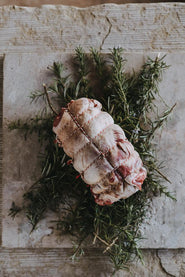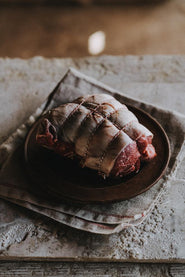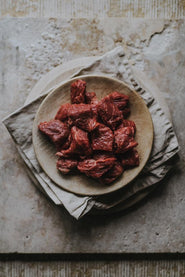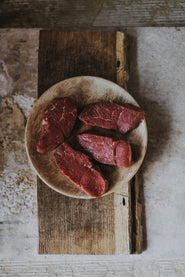Standing in the barn staring at our young brood of Turkeys, who were busily munching on kale stalks and racing around their deep bed of straw, Peter’s voice snapped me out of a mesmerising moment “Abby come and look at this”…
He was stood next to a large white dumpy bag, along with our farmer, Mark. Peter’s large characterful hands reached into the bag and pulled out the most beautiful long threads of pure white sheep’s wool. “Look at this stuff!” he exclaimed with pure glee. At the very same time I caught Mark's face, the opposite of gleeful, he looked defeated.
As Peter basked in the joy of the bountiful wool, sniffing it and rubbing it to release the lanolin, Mark began to tell me the tale of the worth of wool to their farm.
It used to be said that your ‘clips’ would pay a worker for a year on the farm. These days the price of wool wouldn’t even pay for a weeks labour. With most fleeces worth around 20p yet many shearing will take at least a pound for each fleece. Sheep’s wool simply is not worth anything to a farmer anymore.
Mark runs a fabulous mixed farm; Saddleback pigs integrated with fodder crops, Turkeys running alongside the pigs as a seasonal booster. A few parcels of grazing land are left for a small herd of dairy cows and a bunch of sheep.
Running a diverse enterprise is incredibly important to the survival of this small family farm, who were once on the industrial treadmill of milk production and swore they would never go back to solely producing a commodity product.
In order to make this system of mixed farming work, it is vital that the true value of every component that is being produced is being achieved. In the case of the pigs, turkeys and sheep, Mark rears them for us. We agree a price at the beginning of the year and we honour that price all the way through, never fluctuating with the market and always taking the entire carcass. This allows Mark to do what he does best, to focus on the health of his animals and farm in harmony with nature, without the pressure of wondering what price he will achieve each week.
When it comes to the wool he is producing, it is not the same story, he is at the mercy of global markets that seem so out of reach in this quiet corner of Mid Devon.
As a recent article by the Sustainable Food Trust discovered when they interviewed Vincent Pierce of Farming Forum UK; “markets are non-existent at the moment”. Vincent goes on to say that, “it is a shame to see the wool business as a waste disposal business”, and that, “We must think outside the box and come up with new uses to take up large volumes of our wools.”
Historically byproducts such as wool would have been a hugely important component to the financial viability of every sheep rearing farm. However today, even in a normal year the price of an average wool-clip rarely does more than cover its costs and is seen by most farmers as an animal welfare necessity rather than a potential source of income.
As many farmers will also tell you, it’s not just about the money, it is such a waste of what is an incredible product. Wool is a versatile, natural material that we produce in abundance in this country, yet so little of it is used for its full potential. It’s the reason Peter was so gleeful, he, unlike commodity dealers, sees wool for what it is, an incredible resource that needs to be celebrated and harnessed in a circular way.
As we see an increase in micro-plastics, much of it from washing synthetic clothes, pollute our waters there is a clear argument to make that a resurgence of natural fibre and local provenance should be the way forward.
There are some entrepreneurial minds who thankfully have seen the criminal waste of wool and are creating sustainable products that value this material, with new uses such as; housing insulation, compost and even packaging, there are glimmers of hope that wool is finding its way into the circular economy.
However for real change to happen and truly impact farms like Marks', there has to be a reset in the mindset of government and commerce. As SFT highlighted “As it stands, British Wool cannot even access the government’s guaranteed loan scheme, set up to assist businesses through the pandemic because, despite “repeated representations”, the government refuses to see it as a private-sector business. Neither has it been willing to offer any equivalent financing directly.”
In a world so conscious of the environmental impacts from waste, and where nature first, small-scale family farms are increasingly under threat from global imports and the increasing scale of industrialised farming, its time we take stock and start to think about the true cost of the food we are buying, including its valuable byproducts.
If the impacts of Covid-19 has shown us anything this year, it’s that our smaller-scale farmers have shown an unbelievable resilience that meant communities became far more robust during the pandemic than their globalised counterparts. By supporting sustainable farming you are helping to drive the change and disruption that is so needed in order to begin to close the loop.
Every order is delivered in a wool pouch. The wool pouch not only keeps our meat cold, but it is designed to be able to be reused or repurposed. Our wool pouches are fully compostable.







